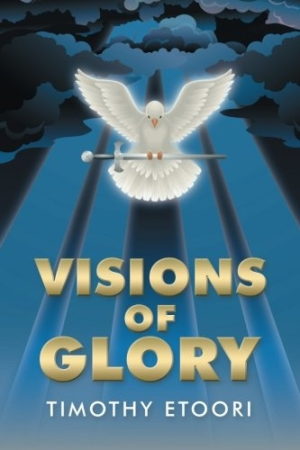Visions of Glory
Visions of Glory is an encouraging exploration of the power of the human spirit and the ways in which faith can inspire existence.
Timothy Etoori’s Christian poetry collection Visions of Glory is both inspirational and thought-provoking.
The collection is conveniently separated into sixteen sections, each covering a different facet of life. Headers like “Descent into Darkness,” “Redemption,” “Devotion,” and “Crucifixion” serve as loose guides to the subject matter of poems in each section.
Some poems read as almost autobiographical. Stanzas begin with “I” and comment on scenes from a first-person perspective. Other poems, however, could be from any perspective, and deal with bigger ideas, including love, attraction, and generational changes.
Shifts in perspective keep reading interesting. Narration moves from the dead in “Grateful Dead” to a horrified world traveler in “The Carcass” to an omniscient speaker in “The Arena,” allowing for a bounty of topics to be covered.
Individually, poems are distinct in style and subject matter; still, the book also reads well as a collection, with each poem contributing to a holistic style.
Loss is a prevalent theme, whether it’s the loss of innocence in poems like “The Prostitute” and “Acid Rain” or the physical loss of life in pieces like “Hospital” and “HIV.” Yet these pieces are not hopeless; the poet takes great pains to create a sympathetic environment and to further the idea that a firm belief in God can combat even the most catastrophic of situations.
Writing is concise, yet vivid and imagery-laden, with each piece packing a substantial punch and evoking a plethora of emotions:
The shadow of greed
Chokes out the sunshine …
A whirlpool of stress
Swirls around a nucleus of worry.
Stylistically, the book experiments with many different types of form and meter, often opting to feature rhyming stanzas that add to the lyrical quality of each piece, as with “Song”:
There is a song I can hear
Playing softly in my ear,
Soothing rhymes that tell me
Soon you’ll be here.
Occasionally, rhyming meter is abandoned for shorter, terse stanzas meant to impart denser meaning, as with “Strange”:
Strange:
How love -
Latent
Hidden,
Has burst forth.
Both approaches effectively emphasize the poet’s language.
The book makes use of both the Bible and instances from everyday life to support its ideas. In later sections, poems sometimes reestablish ideas and perspectives that have already been covered in depth; such poems slow the reading.
Though it is decidedly a work of Christian literature, the collection never sermonizes or condescends. Instead, poems explore the ways in which faith can guide one’s spirit through times of happiness and hardship.
Visions of Glory is an encouraging exploration of the power of the human spirit and the ways in which faith can inspire existence.
Reviewed by
Amanda Adams
Disclosure: This article is not an endorsement, but a review. The publisher of this book provided free copies of the book and paid a small fee to have their book reviewed by a professional reviewer. Foreword Reviews and Clarion Reviews make no guarantee that the publisher will receive a positive review. Foreword Magazine, Inc. is disclosing this in accordance with the Federal Trade Commission’s 16 CFR, Part 255.

